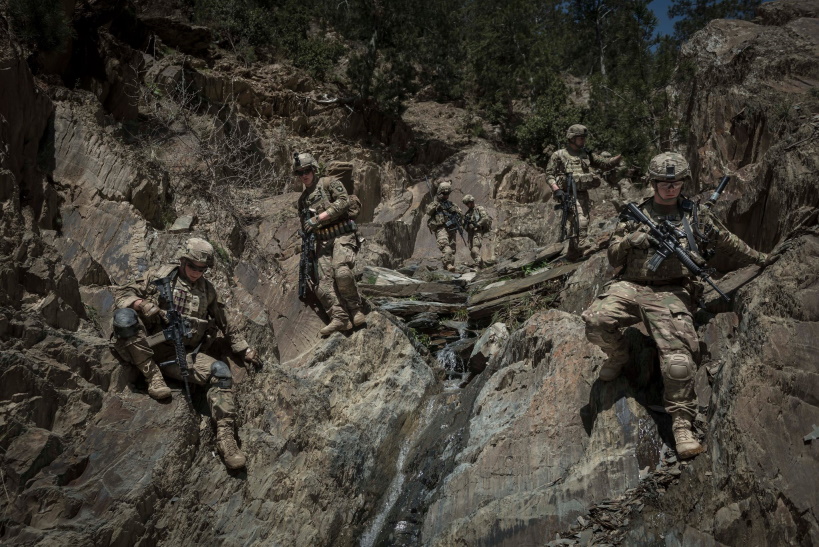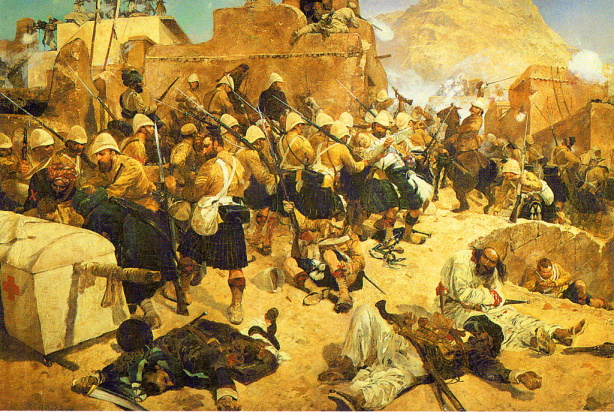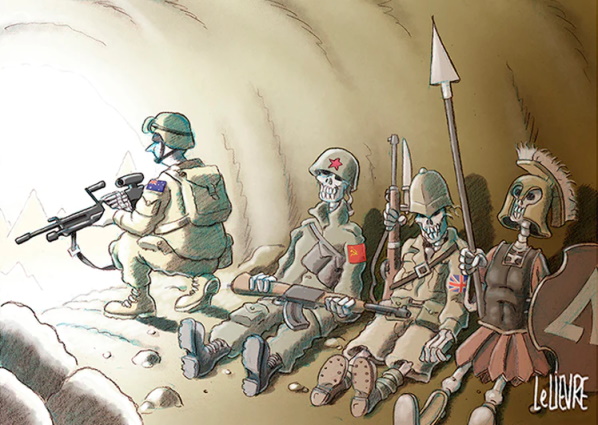

Table of Contents
In recent years, especially with the clumsy US withdrawal, there were many talks about Afghanistan being the so-called “graveyard of empires”. The term, once limited to popular books and mass media, even penetrated scholarly circles. It seems to be a part of international popular culture, probably the most common trope and supposed fact known about the Afghani nation. This poses an important question about Afghanistan - is it really a graveyard of empires?
A tough nut to crack
Contemporary failures
When talking about the topic of Afghani resistance to foreign invasions, the most prominent examples are of modern western superpowers, symbolizing the power of industrial modernization. Of course, the most glaring of these was the recently ended American War in Afghanistan (2001-2021), even though the clashes seem to continue even after the US withdrawal. Without going into details, the invasion started in late 2001 to dislodge the Taliban government and al-Qaeda, the terrorist organization that originated in Afghanistan. As the United States is arguably the strongest military power of our age, its forces were quick to penetrate and take control over the urban areas of the country, establishing its allied Afghani government. It seemed the victory was certain, but the Afghani insurgents merely retreated to the rural mountain area, filled with caves and other hiding spots, and continued to wage a prolonged guerrilla campaign. The US military won numerous skirmishes, battles, and encounters, inflicting significant casualties to the Afghani Taliban fighters, yet they never managed to subdue the entire nation.

US soldiers traversing mountain regions of Afghanistan in 2013. source
In the end, the occupation became futile. The supposed goal of punishing al-Qaeda was achieved, while it seemed that the Afghan insurgents weren’t to be pacified. That prompted the US to “Afghanize” the war in 2014, before finally withdrawing in the summer of 2021. In a matter of weeks, the Taliban forces retook the country, effectively defeating the United States. After 20 years of occupation by the mightiest modern superpower, the Afghanis prevailed. When it became clear that the American campaign in Afghanistan wasn’t going so well, many began linking it and comparing it to the Soviet-Afghan War (1979-1989). It followed a similar development. The Soviet military invaded to support their allied government, quickly took control of urban centers, but failed to achieve control of the rural regions. It allowed the Afghani forces to continue the asymmetric guerilla warfare, which rendered useless all Soviet victories and plans. However, the Soviets withdrew after “only” 9 years of futile combat.
With two superpowers failing to win against the technologically and economically far inferior enemy perfectly fit into the graveyard of empires myth and narrative. Especially considering that some of the scholars linked the Soviet invasion with the fall of the USSR, while the American withdrawal caused considerable turmoil in the US, though not to the same extent. Two biggest modern “empires” were stopped in hilly Afghanistan, with one feeling unstable and the other falling soon after the defeat.
Earlier fiascos
However, defeating two contemporary empires within less than half a decade, despite the unlikeliness of such a feat, isn’t enough to earn the epithet of a graveyard of empires. The foundation of this myth predates the 20th century. At least according to some scholars, it originated with the First Anglo-Afghan War (1839-1842). The reason for the British invasion was the so-called Great Game, a political and diplomatic confrontation between Great Britain and Russia over Central Asia. Like in previous examples, the British expeditionary army managed to conquer Afghanistan, at least its major centers. Yet, they weren’t able to subdue the disjointed rural tribes which continued to struggle for their freedom. It was supposed to be an easy campaign against the “barbarian tribes” equipped mostly with homemade flintlock rifles. Nonetheless, it ended 3 years later with the withdrawal of British troops in what became an embarrassing defeat. Yet another European industrial superpower failed to subdue Afghanistan.
Apart from the three mentioned examples, some writers also evoke the experiences of some earlier invasions. Most notable were the conquests of Alexander the Great (330-327 BCE) and Genghis Khan (1219-1221). Both of these ancient military geniuses had tough and costly campaigns in Afghanistan, losing troops and commanders, facing rebellions after they supposedly conquered the region. These only reinforce the stereotype of Afghanis being resentful of foreign invaders, tough fighters, and hard to control. Nevertheless, both Genghis and Alexander incorporated these lands into their vast empires, at least for a while. Yet, they died soon after their conquests, with their empires quickly fragmenting. That allowed new local Afghani states to rise, prompting some authors to label their invasions as ultimate failures, adding to the legendary graveyard of the empires.
Hard to conquer, but not impossible
Afghani’s under foreign domination
From the previous examples, it is clear that conquering Afghanistan is a tough task even for the strongest and most advanced militaries. More precisely, it is relatively easy to invade and take hold of the urban centers, but fully subduing the rural areas seems to be an altogether different feat. Yet, despite that, the Afghani’s were defeated on several occasions. Examples can be seen in the already mentioned cases. Firstly, the British managed to achieve unquestionable victory in the Second Anglo-Afghan War (1878-1880), once again caused by the Great Game. The result of it was that Afghanistan ceded parts of its territory to British India, while also becoming a semi-independent protectorate.

A painting depicting British forces fighting in Afghanistan in 1880
More strikingly, both the Mongol and Macedonian conquests can also be viewed as victories. While the Afghani tribes put up fierce resistance, they were overcome. Initially, the Mongols held direct control over the region, but as their state began to disintegrate after Genghis Khan’s death in 1227, the Afghani’s slowly reverted to their local autonomy. However, even the largest state in the Afghanistan region, ruled by the Kart dynasty, remained a vassal of some other Mongol ruler. Thus, Mongol dominion lasted for over a century, more than enough to count its conquest as a success. Similarly, though Alexander died in 323 BCE, one of Macedonian successors states, the Seleucid Empire took over control over Afghanistan. Furthermore, when the local state arose in the region, it was the Bactrian or more precisely the Greco-Bactrian Kingdom. As the name implies, it was ruled by the Greeks who were stationed in Afghanistan since Alexander’s death. As the Bactrian Kingdom lasted until about 100 BC, it is clear that Alexander the Great began over 2 centuries of Greek dominion over the Afghanistan region, while the influence of Hellenistic civilization lasted even longer.
Fully successful conquests
Nevertheless, some may still claim those were only partial conquests, as direct occupation quickly gave way to vassalage, in various forms, of Afghani local states. In such cases, there were examples of more successful conquests. An example can be the first-ever invasion of the Afghani region in written history. In 516 BCE, the Achaemenid Persian Empire subjugated the area of modern-day Afghanistan. The Achaemenids held it in direct control until Alexander the Great conquered the region alongside the rest of Persia. It’s worth noting that other Persian dynasties occasionally retook control of the so-called Graveyard of Empires over the centuries, though not always for prolonged periods. Another example of a successful invasion can be the Arab conquest. It began around 650 CE, with the Arab conquerors slowly taking hold over parts of Afghanistan. Tough the Arab dynasties changed, the Arab caliphates continuously governed the region until about the mid-9th century.
Adding to the weight of these annexations is the fact that both Persian and Arab reigns heavily influenced the Afghani civilization. The former brought various artistic and cultural hallmarks, while the Arabs Islamized the Afghani tribes. Another noteworthy conquest was the Mughal invasion. Its first ruler Babur conquered Kabul and its surroundings in 1504, establishing seeds for his Mughal Empire, which then expanded into India. Mughal control lasted until the early 18th century. It was only after they lost dominion over Afghanistan that the local Afghani tribes managed to unite and fight for their full independence, which was achieved in 1747 with the official foundation of Durrani or the Afghan Empire.
A metaphoric or a literal meaning
Where to draw the line?
Considering all the examples, the question revolving around the myth of Afghanistan - is it really a graveyard of empires seems to be an easy one. The answer is, of course, no it isn’t. No empire fell because it invaded Afghanistan, though some did unravel quickly afterward. Furthermore, several empires were able to conquer it without any significant consequences. However, this interpretation comes from the broadest and most literal understanding of Afghanistan’s epithet. Other conclusions can be drawn as well.
For example, if we say that before the rise of the Afghan Empire there was no Afghanistan in our modern conception of the state and nation, then no foreign power managed to conquer it completely. It remained free, though shortly in vassalage of the British Empire. Additionally, we can give a bit of leeway when considering the exact meaning of “graveyard”, interpreting it more as the ability to not be subdued by foreign invasions. In that context of the shortened period and less verbatim understanding of the phrase, one can claim that Afghanistan is indeed a graveyard of the empires. Another possibility is to shy away completely from a precise interpretation of that epithet, seeing it more as an exaggerated mythical narrative warning that the region of Afghanistan is hard to subdue even for the strongest most advanced empires of any age, a claim that is almost undeniably true.
Understanding the myths
The final piece of the puzzle left to unravel is where and why the sobriquet “the graveyard of empires” originated. The precise time when it was coined and attached to Afghanistan is uncertain. Some scholars link it to the First Anglo-Afghan War, while others are satisfied with merely saying the phrase has existed for a long time. However, it seems that its popularity and widespread use only came about in the second half of the 20th century, especially in the wake of Soviet and later US invasions. Thus, it seems the legend of Afghanistan’s toughness is more recent than ancient, though no one can claim with certainty that similar ideas didn’t exist before.

Recent caricature depicting the graveyard of the empires myth. source
The question of why it arose is much easier to extrapolate. Once defeated, great power and its citizens had to explain to themselves and others why their mighty armies failed in a task that should have been an easy victory. The only acceptable explanation was that Afghani’s and their land held some miraculous capability to deter the invaders with their stubbornness and hostile topography. Any other explanation would be perceived as some kind of weakness. In contrast, some Afghani may have accepted the trope to dissuade any future invasion attempts, especially as the nation saw its fair share of fighting and conquests throughout its history.
With that in mind, the legend of the Afghani graveyard of empires certainly had its purpose, as did the ancient mythologies. Likewise, its root remains hidden, but a part of our modern narrative and memory, even if we don’t know its ins and outs.
A truth hidden beneath the lies
In the end, the important question about Afghanistan - is it really a graveyard of empires, has a layered answer. In factuality, no, it isn’t. It couldn’t be as the region was defeated and conquered many times over, even before it became what our modern notions consider the country of Afghanistan. Yet, similarly, if we consider the statement to be a metaphor and a myth, it allows for a much broader and less strict interpretation, one that in some cases can be true. Yet, in reality, such legends, like ancient mythologies, can tell us more about the people that told them than the topics they discussed and described.
However, the trope of Afghanistan as the graveyard of empires hides a much deeper truth. The Afghani region, despite its scarcity and lack of any desirable resources, has stood as an important geopolitical position for millennia. That made it a constant target for others to invade and attempt to subdue its lands and peoples. Thus, as some have argued before, it would be more apt to name Afghanistan “battleground of empires” instead. A place where major powers clash in their search for global domination, while most of its inhabitants only want to be left alone, to live in peace.
